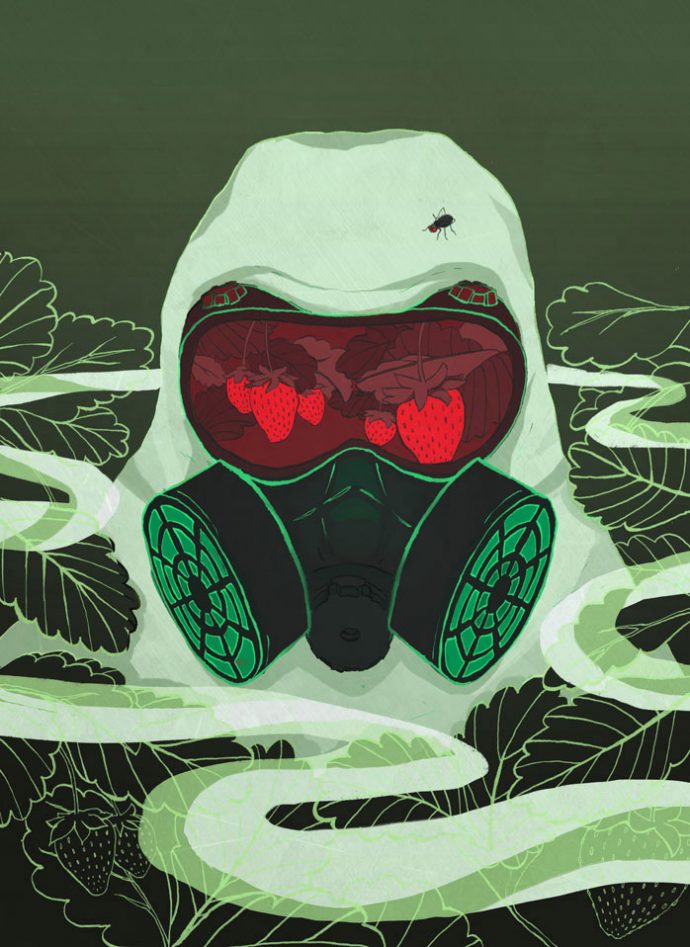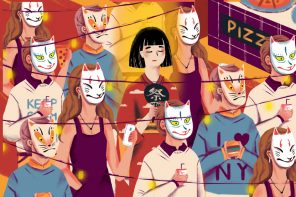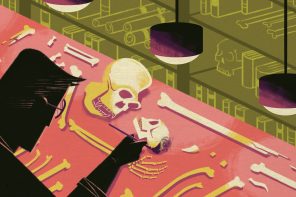I slept in another town, far from the strawberry fields, so as not to hear the sobbing. Despite this, the sobbing was all my mind in its nightly sifting of memories would settle upon, and so no matter the night sounds of insects and dogs, it was all I heard. My dreams could have been called nightmares were they not made up of memories; it was as though I lived each day twice, once by day, once by night. And the music by which the scene recreated itself behind the curtains, each twilight to sweep open again, was the sound of sobbing.
In the town where I slept a few people had started to sicken, though this was to have been a safe zone, this is what we had been told. All the government, medical, and cleanup teams were here, reassuring and talking hope. But every day residents left, abandoning their homes, diminishing the competition in the canned food aisle. Yet the streets didn’t empty, they filled: all those who answer the call of disaster had come; military contractors were stationed on every corner, to perform or prevent what I preferred not to imagine.
In the town to the west—which the media named ground zero, a phrase I would never use—the children sobbed, they could not be quieted. They cried in their hunger and in crying they grew dehydrated and only sicker. The children cried as we tried to speak with them or take their pictures, and then, once they were hospitalized, simply to sit beside them. Their limbs are like popsicle sticks, one newscaster ventured, later to be berated: poor taste to compare starving children to a summer day’s treat. Their limbs are like sticks, some wrote. Like twigs, I almost wrote. But their size was mesmerizing: a body assembled so insubstantially, denied any excess and thus any future, each bone’s form visible, skeleton in friable miniature. The children were dying at the rate of four or five a week. New mothers who had tried to breastfeed had been in most cases lost soon after their infants.
Those who worked in the strawberry fields had been struck first, and this, it was suggested, caused the delay in raising the alert; the first cases had occurred among migrant workers in intervals along the route southward, and the first hospitalizations (at least the first now acknowledged) were south of the border. In this country those stricken were slow to seek care: uninsured, undocumented, and thus willing to endure some weeks of diarrhea. Teachers in the town’s school had for months noted among themselves that those children who had been fat were now thin and those who had been thin were now thinner. When parents came for pick-up or conferences, they too—it was common gossip, what diets were making the rounds in the trailer parks down by the fields?—seemed on average to have shrunk, the once overweight losing fat, skin of the mothers’ arms flapping loosely. What were the teachers to have done? The only question to ask, which more than a few did—even employing the full condescending apparatus of interpreters and social workers—was: Are the children getting enough to eat? Who could have comprehended how this might fail to suffice?
Now the town was divided up into encampments inhabited by medical staff, assorted cleanup crews, security details, journalists, all of us distinguishable by our biohazard suits, huge white things with plastic-windowed faces. Distinguishable, I mean, from the town’s inhabitants; not at all from one another. To recognize anyone suited you had to get quite close and face them squarely; at any angle the light off the plastic window would obscure their features or dazzle the eyes so that one couldn’t make out a face. The contractors we knew by their weapons, a sinister addition to the costume. The farm workers and townspeople had worn the suits as well for a few weeks, after the arrival of the medical teams, until the first round of testing had concluded. The tests determined that most of them had already absorbed well beyond lethally high levels of the toxin, and further exposure was unlikely to worsen the course of the illness. (And if it did—though I heard no one say this—couldn’t that be for the best? Better to go swiftly?) Those who could still in theory be treated had been evacuated to a medical facility outside town. The hopelessness of their own condition was not conveyed to these last residents so directly, but it became understood, and soon enough the afflicted walked down the street or lay in hospital cots unsuited, the attenuated shapes of their bodies in absurd contrast to the monotone troupe the rest of us comprised, their tanned skin warm beside our own whiteness, although it would be fairer to describe their skin as ashen.
As the weeks passed, the local dogs grew louder and ever-present, howling with hunger as their caretakers died or abandoned them. Together, leaner, nearly wild, they formed packs that fought and bayed in the streets. They massed too near the medical centers and makeshift cafeterias and were audible in the background of any gathering. We walked the streets in twos or threes for security, and even I took to carrying a stick to push them from me. Soon enough vans were sent for them, and then they too were scarce.
I am old now. I am not too old. Aging has been nothing like I had expected, since I had expected nothing that I care to recall.
The official count of the town’s dead was 121, 106 of them since I had arrived two weeks ago. I didn’t know how long I would stay. In my room in the town to the east—a house vacated by its owners and given over to vultures like me—I had for something like comfort stacked up and organized my cans. Corn, peas, peas and carrots, pearled onions, stuffed grape leaves, beef chili, turkey chili, baked beans and bacon, fruit cocktail, mandarin oranges, artichoke hearts, one great tower of Boston brown breads. Four pallets of water bottles, an array of hand sanitizer. Another box of victuals was on its way from my university to the local UPS depot (even the most optimistic now conceded that anything left on a porch or stoop would be stolen). I’m not sure who they had send it—a department secretary, I suppose, or a grad student, perhaps honored to have some role in this historic tragedy, to curate the best selection of non-perishables, box and ship them to me seven hundred miles away.
I’ve retired from field work, I had told the institute when they called me in, the day after the first reports of the situation had broken. I should have saved my breath. The curse of having written a book like mine—essential, magisterial, as the blurbs have it—on undocumented labor was that you could never again, even after twenty-five years, beg apathy, remain uninvolved. It’s been too long and this is something else entirely, I said, but then started packing, and when I think back to those early days, my years of interviews, my time in the demonstrations, my own pathetic hunger strike (six days and I collapsed into unconsciousness, woke in shame on a feeding tube), it is as though it happened not to me, but to a lover, a beautiful young woman whose idealism was never quite naïve enough to condemn, and whom I would love to see again, to converse with or to fuck, but whom I do not know as myself. I am old now. I am not too old. Aging has been nothing like I had expected, since I had expected nothing that I care to recall.
And so I returned to the beat, a sixty-two-year-old woman, surrounded by so-called colleagues: journalists vibrant in youth or rugged in middle-age, unwashed rough types and orange-faced idiots ready for any camera. Stupidly I’d brought nice button-downs and two blazers, not anticipating the biohazard suits. Once or twice I tried to go to a bar with the others, a forty-five minute drive to where anything was still open, but I couldn’t sit in peace there, both TVs turned to the news, and instead I took to night walks or sitting and not writing alone in my room.
I imagine that, like me, the others spent some minutes each day considering their shit, its quality and what it might portend.
Teams of scientists addressed us, roomfuls at a time, folding chairs set up in this church or that YMCA for briefings. The scientists and their spokespeople gave their presentations in a sort of simultaneous translation, once in proper science then once in layman’s terms, with enough scientific vocabulary overlaid to suggest authenticity. In the presence of sun and rain of sufficient acidity, chemicals in the pesticide transformed into a toxic compound—name and molecular structure on the overhead—which in a high enough concentration in the human body blocked the absorption of these seven nutrients so that a person would, in effect, starve. No matter what she consumed.
This was an extraordinary thing to witness, the opposite of a miracle: meals were prepared daily with clean food and served to the afflicted, again in church basements (there were many) or school cafeterias. And yet, although the trays were full and then empty, the people sitting before us were nothing, their faces hollowing, arms bearing the thick down of the emaciated, bellies swelling. The children ate pints of ice cream, bags of chips, entire cakes. Of course this is what charities preferred to send, food that contained so few nutrients, it hardly mattered that the body could make nothing of them—but these were the photographs broadcast all over, these brown-skinned children, playground gangs of famine victims, digging at quarts of Neapolitan with plastic spoons. Bizarre malady was the phrase several news networks had settled upon. As though no one could have foreseen any of this, who could have known that, among the monstrosities of creation, this too might one day rise from the earth?
GENVASO engages in frantic cleanup efforts, the newspapers told us, or we told the newspapers. The strawberry plants were uprooted and sealed in plastic, awaiting determination as to whether it was safe to burn them, and where. The laborers responsible for the task wore suits like ours, and so moved very slowly, with an almost comical clumsiness—though I saw them only once; every time since then the security contractors had warned me off, and no one would allow us to interview them. We were assured that GENVASO was monitoring their safety with regular blood tests, and that their heroism would never be forgotten by the company, indeed by the nation; this we were informed of almost daily. The fields were cut out in chunks of earth three feet deep, rocks hauled away. Three feet being the depth beyond which, we were briefed, the pesticide would not permeate. This did not assuage doubts about the groundwater, and when a reservoir was tested and then condemned, those in the county who had not already fled were evacuated. The songbirds, on cue, had lapsed into silence, their bodies to be found on sidewalks or disconcertingly on any path one might take toward the river to relieve one’s mind in the dusk.
The toxin could be found in sweat and had come home from the fields borne on the skin of men and women to their children. Even as I sat, as had become my habit each afternoon, by the children in their cots in the medical center, I wore my suit, and so often I failed to understand their whispered words and heard only their sobbing. No one could say whether brief contact with their skin was sufficient exposure. We held their hands in the exaggerated plastic forms of our own. They held each other’s bare hands, until they became too sick and lay quietly, and no longer cried. I murmured the words to songs we’d sung during the strikes in the old days, sitting on the hot earth, workers getting arrested row by row, beaten with nightsticks, faces pressed to the topsoil. These songs were no lullaby, and if anyone passed near us, I fell back into silence.
Hilary Plum is the author of the novel They Dragged Them Through the Streets (FC2, 2013) and the work of nonfiction Watchfires (Rescue Press, Fall 2016). She lives in Philadelphia.



